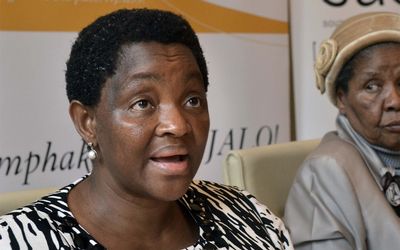IN THE early 2000s, living in the UK, I had a mental list of "things that would never happen in SA". In my interactions with people from all over the world, I developed a healthy appreciation of how societies get ruined. And I had the youthful conviction that, despite our troubled history; civil war, terrorism, drug epidemics, metal detectors in schools, and endemic corruption would not be features of post-apartheid SA.
There are items on that list, like war, that I still think are not in our stars. As for corruption, I imagined SA would not escape it entirely, but I didn’t think it would be endemic. The full scale of the arms deal had not yet sunk in.
I remember a conversation from those heady days in which a classmate’s fiancée remarked that she thought it would be irresponsible for someone to go into politics and not use the opportunity to set their family up with lucrative positions and contracts. She saw my classmates and I as academic idealists. She took it upon herself to set us straight about how the real world works, at least in Nigeria, her home country.
Her partner and the other Nigerian in the room disagreed with her viciously. I could only think that this is what happens when corruption becomes entrenched in a society. All avenues to opportunity close, and if you make it into power, you have a "duty" to share the spoils, because you know it is the only way to advance. Twisted logic, but I got where she was coming from. Of course, this would never happen in SA …
About three years ago I read Behind the Beautiful Forevers, a book set in an impoverished community in Mumbai. Every interaction with officialdom, be it getting a bed in hospital, or preparing for a case to be heard in court, is tainted with corruption. Nothing moves, not even a corpse from the side of the road, unless a bribe is paid. Could SA become like this? By the time I read this book, I was far less smug.
But you keep hoping that all is not lost, that there must be some good men and women in power whose words and deeds are above board. African National Congress (ANC) Women’s League president Bathabile Dlamini recently slapped some sense into me. It was almost physically painful to hear her talk about the small skeletons that stalk every ANC national executive committee member’s shadow. This has been interpreted as a silencing tactic. Whatever the game at play, it is a pretty damning statement.
Now the onus has been placed on individuals to come forward to detail their brushes with alleged state capture. It is likely to be a long, legalistic process that saps the energy and resources of those who dare to come forward. This follows the trend where failures of leadership and judgment are particularised into technical contraventions of laws or regulations.
We do not demand that our leaders show integrity, we merely ask that they demonstrate that there is not enough evidence to act against them. Meanwhile, the country’s development is as stuck as the skeletons in the closet.
Now that the post-liberation glow is well behind us, it is clear that we are not immune to the dysfunctions that plague the rest of the world. We struggle to learn from other countries’ mistakes. Our challenge is made even greater by the facts of severe economic inequality and racial tension, which undermine broad-based efforts to challenge political incumbents.
The prospects of a saviour or the ballot box delivering us from misgovernance are slim. A movement of the excluded, those without skeletons and vested interests in the system, might help us get unstuck. As the clock ticks, we are steadily marching down the metaphorical path from miracle nation to cautionary tale.
• Makhaya is the CEO of Makhaya Advisory

Social Development Minister Bathabile Dlamini. Picture: TREVOR SAMSON
IN THE early 2000s, living in the UK, I had a mental list of "things that would never happen in SA". In my interactions with people from all over the world, I developed a healthy appreciation of how societies get ruined. And I had the youthful conviction that, despite our troubled history; civil war, terrorism, drug epidemics, metal detectors in schools, and endemic corruption would not be features of post-apartheid SA.
There are items on that list, like war, that I still think are not in our stars. As for corruption, I imagined SA would not escape it entirely, but I didn’t think it would be endemic. The full scale of the arms deal had not yet sunk in.
I remember a conversation from those heady days in which a classmate’s fiancée remarked that she thought it would be irresponsible for someone to go into politics and not use the opportunity to set their family up with lucrative positions and contracts. She saw my classmates and I as academic idealists. She took it upon herself to set us straight about how the real world works, at least in Nigeria, her home country.
Her partner and the other Nigerian in the room disagreed with her viciously. I could only think that this is what happens when corruption becomes entrenched in a society. All avenues to opportunity close, and if you make it into power, you have a "duty" to share the spoils, because you know it is the only way to advance. Twisted logic, but I got where she was coming from. Of course, this would never happen in SA …
About three years ago I read Behind the Beautiful Forevers, a book set in an impoverished community in Mumbai. Every interaction with officialdom, be it getting a bed in hospital, or preparing for a case to be heard in court, is tainted with corruption. Nothing moves, not even a corpse from the side of the road, unless a bribe is paid. Could SA become like this? By the time I read this book, I was far less smug.
But you keep hoping that all is not lost, that there must be some good men and women in power whose words and deeds are above board. African National Congress (ANC) Women’s League president Bathabile Dlamini recently slapped some sense into me. It was almost physically painful to hear her talk about the small skeletons that stalk every ANC national executive committee member’s shadow. This has been interpreted as a silencing tactic. Whatever the game at play, it is a pretty damning statement.
Now the onus has been placed on individuals to come forward to detail their brushes with alleged state capture. It is likely to be a long, legalistic process that saps the energy and resources of those who dare to come forward. This follows the trend where failures of leadership and judgment are particularised into technical contraventions of laws or regulations.
We do not demand that our leaders show integrity, we merely ask that they demonstrate that there is not enough evidence to act against them. Meanwhile, the country’s development is as stuck as the skeletons in the closet.
Now that the post-liberation glow is well behind us, it is clear that we are not immune to the dysfunctions that plague the rest of the world. We struggle to learn from other countries’ mistakes. Our challenge is made even greater by the facts of severe economic inequality and racial tension, which undermine broad-based efforts to challenge political incumbents.
The prospects of a saviour or the ballot box delivering us from misgovernance are slim. A movement of the excluded, those without skeletons and vested interests in the system, might help us get unstuck. As the clock ticks, we are steadily marching down the metaphorical path from miracle nation to cautionary tale.
• Makhaya is the CEO of Makhaya Advisory





















Change: 1.37%
Change: 1.32%
Change: 2.91%
Change: 0.45%
Change: 3.09%
Data supplied by Profile Data
Change: 1.59%
Change: 0.47%
Change: 1.37%
Change: 0.00%
Change: 0.44%
Data supplied by Profile Data
Change: 0.23%
Change: -0.03%
Change: 0.06%
Change: 0.30%
Change: 0.00%
Data supplied by Profile Data
Change: 0.25%
Change: 0.31%
Change: 0.13%
Change: 0.36%
Change: -0.66%
Data supplied by Profile Data